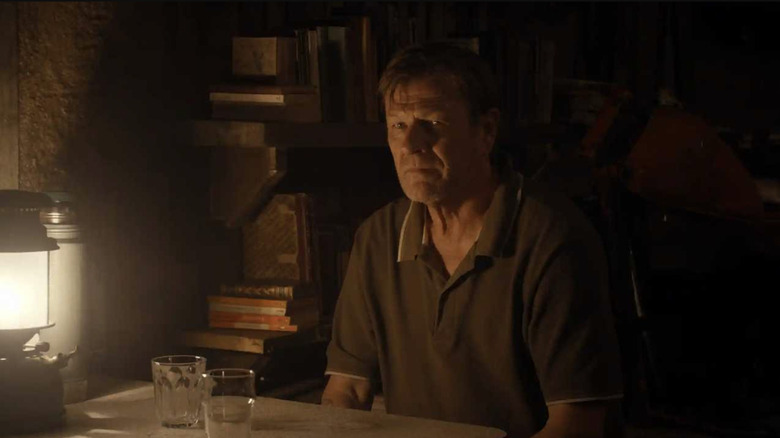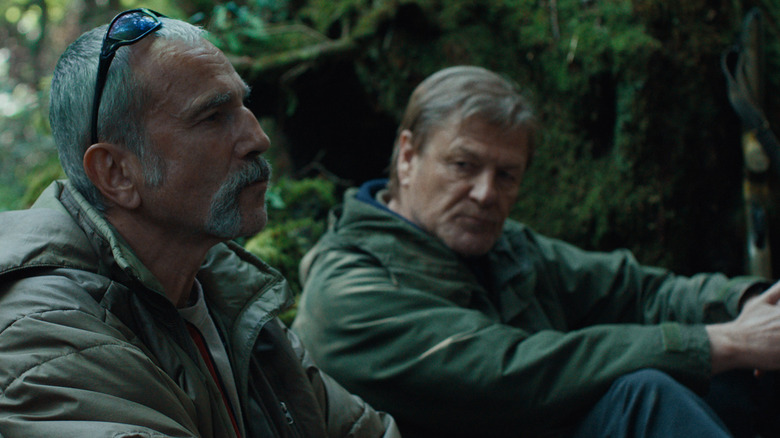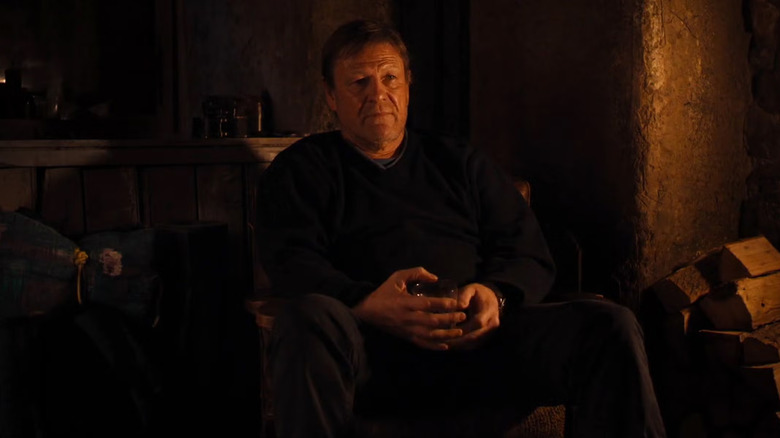Anemone's Secret Weapon Isn't Daniel Day-Lewis
This article contains spoilers for "Anemone."
There's no question that "Anemone" wouldn't exist without the contributions of Daniel Day-Lewis. Not only is the film co-written and directed by his son, Ronan, but Daniel also co-wrote, executive-produced, and stars in the picture. "Anemone" is enough of an ensemble that one could say Day-Lewis isn't necessarily the lead of the film, but his character of Ray Stoker, certainly plays a pivotal role. Both Daniel and Ronan Day-Lewis seem acutely aware of the importance of the former being involved, as the actor famously publicly retired after making "Phantom Thread" in 2017. Inherently knowing that audiences will be showing up to see him act, Daniel and Ronan construct "Anemone" around several lengthy monologues, the majority of which are performed by Daniel. It's enough to make the film almost seem like the cinematic equivalent of a one-man show.
However, "Anemone" is emphatically not "The Daniel Day-Lewis Show," and this is demonstrated in ways that may be subtle to a general audience but are absolutely crucial. For instance, the other actors like Samantha Morton and Samuel Bottomley play characters who make the film a much more fleshed-out experience, and the imagery that Ronan Day-Lewis and cinematographer Ben Fordesman bring to the film is essential to decoding its themes and emotional arc. The number one most important player following Daniel, though, is Sean Bean. Again, this may sound strange to someone doing a surface analysis of the movie, as Bean's character, Jem Stoker, barely speaks in the majority of scenes he appears in. Yet Bean's work is a consummate example of the adage that acting is really all about reacting. A mediocre actor will only bring as much to the part as exists on the page, but a great actor will turn what may seem like a small part into gold. Bean is a great actor, and he's the secret weapon of "Anemone."
Bean's presence lends Day-Lewis' performance greater weight
It's certainly true that a film or stage play that only features a single actor can work, and it's all about the material and the context as well as the actor's ability. Yet "Anemone" was not conceived as a single-character story, meaning that the other characters are just as important as Ray. Sure, Day-Lewis' performance of his several monologues may have been just as good if he were speaking directly to the audience, but the presence of Sean Bean's Jem gives them a greater weight and intention than if they were more generally directed. In other words, Ray isn't aware he's delivering a monologue to an audience of moviegoers; he's saying these things to his estranged younger brother, and it's Jem's reaction to them through Bean's performance that gives these monologues shape, dimension, and resonance.
Consider Ray's most central, revealing, and emotional monologue, where he confesses to the incident that caused him to be dishonorably discharged from the British military during the Troubles. His mercy killing of what he perceived to be a mortally wounded young Irish boy after a bomb accidentally went off is a memory that the man has clearly been running from his whole life, literally and figuratively. His rationalization of his actions is evidently not enough for him, perhaps due to his strict religious upbringing and the conflicted feelings he has toward that. All of this is conveyed by Day-Lewis' powerfully heartfelt delivery, yet the moment wouldn't be as powerful if Jem weren't taking all of this in. Bean's choice to remain in stoic shock while his brother collapses into tears provides the scene with an emotional counterpoint, allowing the revelation to reverberate in a much stronger way than if Day-Lewis were by himself, or if Bean had made a more conventional acting choice. He may only be listening, but he's actively listening, and that makes a huge difference.
Bean's Jem is the most fascinating character in 'Anemone'
Every principal character in "Anemone" is treated like an onion, as layer after layer peels off during the film's runtime until we have a much deeper understanding of their inner turmoil. One could say that Jem is the most simplistic character, a working-class, devout Catholic Brit, being much more of a stiff upper lip type. Yet Bean doesn't play Jem this way, and instead his performance makes Jem seem like a rock within the stormy Stoker family.
To wit: after the violent incident that Brian (Bottomley) gets involved in, it's Jem who decides to seek out Ray to convince him to come visit the son (if not the family) he abandoned. As we learn more about the Stokers' history, we discover that Jem took it upon himself to marry Nessa (Morton), Ray's ex, and become a stepfather to Brian, who is really Ray's son. There's an element of Catholic guilt in him, of course, which makes his motivations for being the dad who stepped up seem less noble and more imposed. Yet the way Jem acts as a sounding board for Ray's bitter invectives allows the latter to realize that he's actually been flagellating himself all these years for his troubled past.
Bean plays Jem as part knowing brother, part priest, making his journey to the deep woods where Ray has fled a sort of missionary outing. Although Jem is never given a lengthy monologue to explain his side of the story in as much detail as Ray, Nessa, or even Brian does, Bean's performance is as richly layered as the rest of the cast's. The way in which one needs to observe Bean more than simply listen to him aligns Jem with the film's rich tapestry of surrealistic and symbolic imagery. So, while Jem may be the least well-drawn character on paper, Bean's performance makes him fascinating. He's exemplary of a film that invites audiences to have a little patience and look a little deeper to be rewarded.
"Anemone" is in theaters now.


